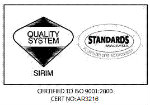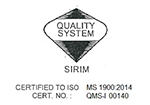Sustainable Halal Food Industry
On many occasions, the Malaysian Muslim consumers have been called to boycott some popular household food products. Reasons for the boycott may be caused by either non-halal ingredients used in the food products or the products are made by countries which support the oppressions of fellow Muslims worldwide. Such a reaction is typical of Malaysian Muslims over the years—an immediate response driven by emotion as soon as the issue hit the headlines, but the zeal fizzles out when the issue no longer hog the limelight.
However, do we ever think or plan anything that could provide us with a much sustainable solution that can benefit the Muslim ummah (community) in preparing ourselves to be self-sustaining of our food supply?
Most of the foods we consume today are the result of extensive research and development efforts in the interrelated fields of food science and technology, which eventually contribute to the food industry—arguably the largest global manufacturing industry and dominated by large multinational corporations. With in-depth knowledge and expertise in food science and technology, a variety of safe, affordable, and tasty food products can be produced and accepted as popular global household products.
As society evolves over time, food scientists and technologists around the world continuously work to improve the quality of human life by searching for new and better ways of selecting, preserving, processing, packaging, distributing food products and discovering new possibilities of food sources.
Invariably, the global food system is becoming more complex and huge with increasing trend in worldwide population, GDP growth, urbanisation process, wealth and the way we work and live, which lead to different food and eating habits. The growing demand for modern types of food such as convenience food is the trend observed today. Due to the changing eating habits of people, the global food industry is no longer the same as decades ago which sources of raw materials were entirely based on agriculture and farming activities.
Undoubtedly, the proliferation of modern technology has revolutionised the global food industry and it has become more technology-savvy and knowledge-driven rather than through sweat and hard labour we used to know before this era. The large extent of our food today is not much the product of farmers or fishermen, but rather, the products of highly knowledgeable and professional food scientists and technologists. Indeed, most of the food products originate from scientific labs rather than farms.
Thus, to cope with mankind’s insatiable demand for food, developing new, safe and more nutritious food is a continuous and exciting challenge in the global food industry. With highly sophisticated technology employed in the food production such as resource-conserving technologies, dry cooling system, energy-saving machines, processes and heat recovery “intelligent” engineering solutions, and many more innovations and inventions to come, food production is indeed one activity that is high value added and high income from the macroeconomics perspective.
Economically, the wide and varied range of processes involved in the food industry certainly offer not only employment opportunities aplenty in both public and private sectors but also exciting career paths. Although different from the conventional choices of medicine, engineering, accounting or law, the food industry promises good prospects and benefits for the growing young Malaysian workforce. In fact in recent years, there has been a constant demand for expertise in the local food industry. Furthermore, Malaysia has a large and growing food retail market that is supplied by local and imported products. Indeed, the various opportunities available in the food industry, including that of halal-related, should be grabbed by Muslims who have yet to be fully aware of the bright future the food industry holds.
Of late, the word “boycott” seems to be the catchphrase of the Muslim community when dealing with halal issues in food manufacturing. Rather than dwell on such matters by piecemeal, we should act on overcoming the issue comprehensively and concertedly. Thinking or planning a strategy is a start that will provide us with a much sustainable solution that can benefit the entire Muslim ummah. Undoubtedly, this would put an end once and for all any further emotional reactions to halal issues that merely feed some immediate cheap publicity purposes.





